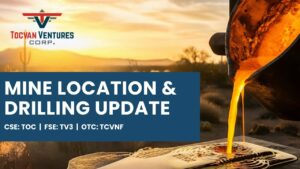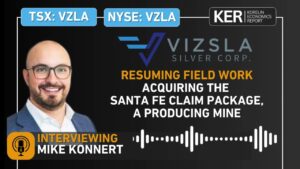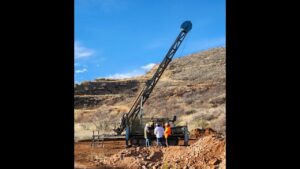Hecla reports record annual revenue, gold production and silver reserves
COEUR D’ALENE, Idaho–(BUSINESS WIRE)– Hecla Mining Company (NYSE:HL) today announced fourth quarter and full year 2019 financial and operating results.
HIGHLIGHTS
- Fourth quarter sales of $225 million; cash flow from operations of $57 million; net loss of $8.0 million; and adjusted EBITDA of $62 million.1
- 2019 silver production of 12.6 million ounces, up 22% and record gold production of 272,873 ounces, up 4%, over 2018.
- 2019 sales of $673.3 million (the highest in the company’s history); cash flow from operations of $120.9 million; net loss of $99.6 million; and adjusted EBITDA of $177.7 million.1
- Record reserves for silver, lead and zinc; increases of 11%, 5% and 8%, respectively over 2018.
- Net debt reduction of approximately $136 million, or more than 23%, from the peak net debt mid-year.
- Cash and cash equivalents of $62 million at year end, an increase of $35 million with no borrowings on the revolving line of credit facility.
- Lowest All Injury Frequency Rate (AIFR) in Company history.
- Lucky Friday return to full production is underway and expected to be complete by the end of 2020.
- Moody’s Investors Service upgraded Hecla’s Corporate Family Rating from Caa1 to B3 with a stable outlook.
“2019 was a tale of two halves where the second half had higher production, higher prices, better earnings and more cash flow,” said Phillips S. Baker, Jr., President and CEO. “The strong third and fourth quarters markedly improved our financial condition, putting us in a better position to refinance the Senior Notes.”
“In 2020, at current prices, we expect continued strong cash flow generation with the ongoing solid performance at Greens Creek, the ramp-up of Lucky Friday, expected improvements at Casa Berardi and the potential mine life extension at San Sebastian from the Hugh Zone,” Mr. Baker added.
SILVER AND GOLD RESERVE SUMMARY
Proven and probable reserves are 212 million ounces of silver, an increase of 11% over last year and 2.71 million ounces of gold, a decrease of 5%. Proven and probable lead and zinc reserves of 810,930 tons and 1,001,930 tons are increases of 5% and 8%, respectively. The reserves for silver, lead and zinc are the highest in Company history. The price assumptions used for 2019 reserves of $14.50 for silver, $1.15 for zinc and $0.90 for lead are unchanged this year and our assumption for gold is $100 higher at $1,300 per ounce. The silver price assumption is among the lowest in the industry again this year.
Please refer to the reserves and resources tables at the end of this press release, or to the press release entitled “Hecla Reports Record Silver, Lead and Zinc Reserves” released on February 5, 2020, for the breakdown between proven and probable reserve and resource levels, as well as a detailed summary of the Company’s exploration programs.
FINANCIAL OVERVIEW
| Fourth Quarter Ended | Twelve Months Ended | ||||||||||||||
| HIGHLIGHTS | December 31, 2019 | December 31, 2018 | December 31, 2019 | December 31, 2018 | |||||||||||
| FINANCIAL DATA | |||||||||||||||
| Sales (000) | $ | 224,945 | $ | 136,520 | $ | 673,266 | $ | 567,137 | |||||||
| Gross profit (loss) (000) | $ | 25,318 | $ | (1,265 | ) | $ | 23,399 | $ | 79,099 | ||||||
| Loss applicable to common stockholders (000) | $ | (8,114 | ) | $ | (23,831 | ) | $ | (100,109 | ) | $ | (27,115 | ) | |||
| Basic and diluted loss per common share | $ | (0.02 | ) | $ | (0.05 | ) | $ | (0.20 | ) | $ | (0.06 | ) | |||
| Cash provided by operating activities (000) | $ | 57,257 | $ | 19,011 | $ | 120,866 | $ | 94,221 |
Net loss applicable to common stockholders for the fourth quarter and full year of 2019 was $8.1 million and $100.1 million, or $0.02 and $0.20 per basic share, respectively, compared to net losses applicable to common stockholders of $23.8 million and $27.1 million, or $0.05 and $0.06 per basic share, respectively, for the fourth quarter and full year of 2018. Among items impacting the results for the 2019 periods compared to 2018 were the following:
- Gross profit for the fourth quarter of 2019 was higher by $26.6 million. The variance was due in part to higher gross profit at Greens Creek and San Sebastian of $22.0 million and $4.2 million, respectively, and lower losses in Nevada and Lucky Friday of $3.1 million and $2.4 million, respectively, partly offset by higher losses at Casa Berardi of $5.1 million for the fourth quarter.
- Gross profit for the full year of 2019 was $55.7 million less, principally due to depreciation expense in Nevada.
- Losses on metal derivative contracts for the fourth quarter and full year of 2019 of $1.3 million and $4.0 million, respectively, compared to a slight loss in the fourth quarter and a gain of $40.3 million in the full year. During the third quarters of 2019 and 2018, the Company settled in-the-money contracts prior to their maturity date, for cash proceeds of approximately $6.7 million and $32.8 million, respectively.
- Foreign exchange losses of $1.5 million and $8.2 million were recognized in the fourth quarter and full year of 2019, respectively, compared to gains of $7.5 million and $10.3 million, respectively. The variances were primarily due to changes in the value of the Canadian dollar relative to the U.S. dollar.
- Interest expense was $14.7 million in the fourth quarter and $48.4 million for the full year of 2019 compared to $10.9 million and $40.9 million, respectively. The increase in the 2019 periods was due to a loss on the prepayment of the Ressources Quebec Note and increased amounts drawn on the revolving credit facility, which were repaid, leaving no amount drawn as of December 31, 2019.
- Income tax benefit for the fourth quarter and full year of 2019 of $4.1 million and $24.1 million, respectively, compared to benefits of $5.2 million and $6.7 million, respectively.
- Suspension costs for the fourth quarter of $3.3 million and $12.1 million for the full year of 2019, compared to costs of $2.4 million and $20.7 million, respectively.
- Exploration and pre-development expense was $3.0 million for the fourth quarter and $19.1 million for the full year of 2019, compared to $9.4 million and $40.6 million, respectively due to reduced spending at all sites.
Cash provided by operating activities for the fourth quarter and full year of 2019 of $57.3 million and $120.9 million, respectively, was $38.2 million and $26.6 million higher, respectively, compared to the prior year periods. The increase in the fourth quarter of 2019 was primarily due to lower spending in Nevada, higher sales and lower exploration. The increase for the full year of 2019 was a result of the same factors, along with lower acquisition costs and Lucky Friday suspension costs and the impact of working capital changes, partially offset by lower cash proceeds from settlement of base metals derivative contracts prior to their maturity date.
Adjusted EBITDA increased $43.2 million quarter-over-quarter, and the $177.7 million in 2019 was $6.4 million more than 2018.1 The increases were primarily due to lower spending in Nevada, higher sales, and lower exploration spending.
Fourth quarter capital expenditures totaled $23.8 million, including $12.9 million at Greens Creek, $7.7 million at Casa Berardi, and $3.0 million at Lucky Friday. Capital expenditures, including non-cash items for equipment acquired under finance leases, for the year 2019 totaled $128.1 million, compared to last year’s $140.6 million.
Metals Prices
Average realized silver prices in the fourth quarter and full year 2019 were $17.47 and $16.65 per ounce, respectively, compared to $14.58 and $15.63, respectively, for the prior year periods. Average realized prices for gold for the fourth quarter and full year 2019 were $1,488 and $1,413 per ounce, respectively, higher by 20% and 12%, respectively, compared to the prior year periods. Average realized prices for lead were 3% higher, with the zinc price 4% lower quarter-over-quarter. The average realized prices for lead and zinc for the full year of 2019 were 13% and 10% lower, respectively, compared to 2018.
OPERATIONS OVERVIEW
Overview
The following table provides the production summary on a consolidated basis for the fourth quarter and twelve months ended December 31, 2019 and 2018:
| Fourth Quarter Ended | Twelve Months Ended | |||||||||||
| December 31, 2019 | December 31, 2018 | December 31, 2019 | December 31, 2018 | |||||||||
| PRODUCTION SUMMARY | ||||||||||||
| Silver – | Ounces produced | 3,411,988 | 2,715,385 | 12,605,234 | 10,369,503 | |||||||
| Payable ounces sold | 3,999,013 | 2,260,690 | 11,548,373 | 9,254,385 | ||||||||
| Gold – | Ounces produced | 74,773 | 70,987 | 272,873 | 262,103 | |||||||
| Payable ounces sold | 85,237 | 64,478 | 275,060 | 247,528 | ||||||||
| Lead – | Tons produced | 6,804 | 4,704 | 24,210 | 20,091 | |||||||
| Payable tons sold | 7,118 | 3,615 | 19,746 | 16,214 | ||||||||
| Zinc – | Tons produced | 16,185 | 13,711 | 58,857 | 56,023 | |||||||
| Payable tons sold | 12,147 | 9,201 | 39,381 | 39,273 |
The following tables provides a summary of the final production, cost of sales and other direct production costs and depreciation, depletion and amortization (“cost of sales”), cash cost, after by-product credits, per silver or gold ounce, and All in Sustaining Cost (“AISC”), after by-product credits, per silver and gold ounce, for the fourth quarter and twelve months ended December 31, 2019:
| Fourth Quarter Ended | Total | Greens Creek | Lucky Friday | San Sebastian | Casa Berardi | Nevada Operations | |||||||||||||||||||
| December 31, 2019 | Silver | Gold | Silver | Gold | Silver | Silver | Gold | Gold | Silver | Gold | Silver | ||||||||||||||
| Production (ounces) | 3,411,988 | 74,773 | 2,741,090 | 15,356 | 216,488 | 422,434 | 3,897 | 34,793 | 10,499 | 20,727 | 21,477 | ||||||||||||||
| Increase/(decrease) over 2018 | 26 | % | 5 | % | 27 | % | 17 | % | 1,562 | % | (5 | )% | 33 | % | (3 | )% | 43 | % | 9 | % | (76 | )% | |||
| Cost of sales & other direct production costs and depreciation, depletion and amortization (000) | $ | 91,124 | $ | 108,503 | $ | 71,481 | N/A | $ | 5,472 | $ | 14,171 | N/A | $ | 60,444 | N/A | $ | 48,059 | N/A | |||||||
| Increase/(decrease) over 2018 | 45 | % | 45 | % | 48 | % | N/A | 40 | % | 33 | % | N/A | 28 | % | N/A | 74 | % | N/A | |||||||
| Cash costs, after by-prod credits, per silver or gold ounce 2,4 | $ | 3.58 | $ | 1,003 | $ | 2.76 | N/A | N/A | $ | 8.89 | N/A | $ | 1,037 | N/A | $ | 946 | N/A | ||||||||
| Increase/(decrease) over 2018 | $ | (0.43 | ) | $ | (45 | ) | $ | 0.97 | N/A | N/A | $ | (5.89 | ) | N/A | $ | 97 | N/A | $ | (305 | ) | N/A | ||||
| AISC, after by-prod credits, per silver or gold ounce 3 | $ | 11.31 | $ | 1,187 | $ | 7.86 | N/A | N/A | $ | 11.78 | N/A | $ | 1,278 | N/A | $ | 1,024 | N/A | ||||||||
| Increase/(decrease) over 2018 | $ | (2.22 | ) | $ | (395 | ) | $ | (0.06 | ) | N/A | N/A | $ | (7.73 | ) | N/A | $ | (70 | ) | N/A | $ | (996 | ) | N/A |
| Twelve Months Ended | Total | Greens Creek | Lucky Friday | San Sebastian | Casa Berardi | Nevada Operations | |||||||||||||||||||||||
| December 31, 2019 | Silver | Gold | Silver | Gold | Silver | Silver | Gold | Gold | Silver | Gold | Silver | ||||||||||||||||||
| Production (ounces) | 12,605,234 | 272,873 | 9,890,125 | 56,625 | 632,944 | 1,868,884 | 15,673 | 134,409 | 31,540 | 66,166 | 181,741 | ||||||||||||||||||
| Increase/(decrease) over 2018 | 22 | % | 4 | % | 24 | % | 10 | % | 274 | % | (8 | )% | 5 | % | (17 | )% | (17 | )% | N/A | N/A | |||||||||
| Cost of sales & other direct production costs and depreciation, depletion and amortization (000) | $ | 278,849 | $ | 371,018 | $ | 211,719 | N/A | $ | 16,621 | $ | 50,509 | N/A | $ | 217,682 | N/A | $ | 153,336 | N/A | |||||||||||
| Increase/(decrease) over 2018 | 15 | % | 51 | % | 11 | % | N/A | 70 | % | 21 | % | N/A | 9 | % | N/A | N/A | N/A | ||||||||||||
| Cash costs, after by-prod credits, per silver or gold ounce 2,4 | $ | 2.93 | $ | 1,066 | $ | 1.97 | N/A | N/A | $ | 8.02 | N/A | $ | 1,051 | N/A | $ | 1,096 | N/A | ||||||||||||
| Increase/(decrease) over 2018 | $ | 1.85 | $ | 195 | $ | 3.10 | N/A | N/A | $ | (1.67 | ) | N/A | $ | 251 | N/A | N/A | N/A | ||||||||||||
| AISC, after by-prod credits, per silver or gold ounce 3 | $ | 10.13 | $ | 1,411 | $ | 5.99 | N/A | N/A | $ | 12.10 | N/A | $ | 1,354 | N/A | $ | 1,527 | N/A | ||||||||||||
| Increase/(decrease) over 2018 | $ | (1.31 | ) | $ | 185 | $ | 0.41 | N/A | N/A | $ | (2.58 | ) | N/A | $ | 274 | N/A | N/A | N/A | |||||||||||
Greens Creek Mine – Alaska
The increase in silver and gold production for the quarter and full year resulted from higher grades, with the quarterly increase also due to higher throughput. The mill operated at an average of 2,351 tons per day (tpd) in the fourth quarter and 2,318 tpd for the full year. The annual throughput was a record.
The higher cost of sales and per silver ounce cash costs, for the periods were primarily due to higher production costs and treatment charges. The decrease in AISC per silver ounce, for the quarter resulted from higher silver production.
For the full year of 2019, Greens Creek generated cash provided by operating activities of approximately $136.2 million and spent $29.3 million on additions to properties, plants and equipment, resulting in free cash flow of $106.9 million.5
Casa Berardi – Quebec
Lower quarterly and annual gold production was due to lower grades, as planned. Gold production was also impacted by lower mill throughput and recoveries in the first half of 2019 due to planned adjustments to a number of mill components to accommodate higher throughput, and the requirement for a new carbon in leach (CIL) tank drive-train, which was installed in May 2019. The mill operated at an average of 3,950 tpd in the fourth quarter 2019 and 3,775 tpd for the year.
Higher quarterly and annual cost of sales were due to the extension of stripping at the East Mine Crown Pillar (EMCP) pit as well as increased quantities of waste and ore extracted from the pit and higher haulage costs due to deepening of the pit. Milling costs were also higher due to costs for pre-crushing of ore to allow for increased throughput, and higher costs for mill enhancements, maintenance and reagents. These factors impacting mining and milling costs, along with lower gold production, also resulted in increased cash costs per gold ounce. However, AISC per gold ounce declined in the fourth quarter due to lower capital spending.
For the full year of 2019, Casa Berardi generated cash provided by operating activities of approximately $55.7 million and spent $35.8 million on additions to properties, plants and equipment, resulting in free cash flow of $20.0 million.5
Process improvement studies are being implemented in 2020 in an effort to improve throughput, recovery and lower costs to increase cash flow.
San Sebastian – Mexico
San Sebastian’s lower metal production was expected due to the transition from shallow, high-grade open pits to lower-grade underground production. The mill operated at an average of 425 tpd in the fourth quarter 2019 and 479 tpd for the year.
The higher cost of sales was due to the higher cost of underground mining and depreciation. Cash cost and AISC per ounce, after by-product credits, were lower as a result of higher by-product credits, due to higher gold production prices, with AISC also impacted by lower exploration spending.
For the full year of 2019, San Sebastian generated cash provided by operating activities of approximately $19.1 million and spent $5.0 million on additions to properties, plants and equipment, resulting in free cash flow of $14.1 million.5
The Company is completing its study on the Hugh Zone sulfide ore and expects a decision on development in the first quarter, which would allow production to begin by the end of the year.
Nevada Operations
Gold production was 9% higher quarter-over-quarter. The assets were acquired on July 20, 2018. During 2019, ore was processed at an average of 576 tpd.
Cost of sales for the year rose primarily as a result of reporting a full year’s results, and were higher for the fourth quarter due to higher sales volume and increased depreciation. However, per gold ounce cash costs and AISC declined for the fourth quarter by $305 and $996 per gold ounce because of increased gold production resulting from higher grades, with the decrease in AISC also due to lower exploration spending, partially offset by higher sustaining capital.
The mining of developed ore is expected to continue at Fire Creek until about mid-year, when the mining activities are planned to pause. To lower the cut-off grade, the Company is studying mining methods, processing of refractory ore and hydrology. Production is not anticipated to begin again until these studies are successfully completed and permitted.
Lucky Friday Mine – Idaho
Production in 2019 was similar to 2018 with the production and capital improvements being performed by salaried staff.
Union workers at Lucky Friday ratified the collective bargaining agreement in January 2020, and many are beginning to return to work. The Company anticipates re-staffing of the mine to take place in stages, with a ramp-up to full production levels expected by the end of 2020.
Underground testing and modification of the Remote Vein Mining (RVM) machine is underway in Sweden. The machine is expected to be sent to Lucky Friday by late 2020.
EXPLORATION AND PRE-DEVELOPMENT
Exploration
Exploration (including corporate development) expenses were $2.4 million and $15.9 million for the fourth quarter and full year 2019, respectively. This represents a decrease of 71% and 55% over the fourth quarter and full year 2018. These decreases were primarily the result of lower expenses at the Nevada operations and overall decreased site exploration during 2019.
A complete summary of exploration activities can be found in the news release entitled “Hecla Reports Record Silver, Lead and Zinc Reserves” released on February 5, 2020.
Pre-development
Pre-development spending was $0.6 million in the fourth quarter and $3.2 million for the full year 2019, principally to advance the permitting at Rock Creek and Montanore.
Rock Creek/Montanore
At Rock Creek, the Company updated and the Kootenai National Forest partially approved its plan of operation to reflect the Record of Decision (ROD) issued in 2018. In December 2019, the Company submitted an amendment application to the Montana Department of Environmental Quality to modify the existing Exploration License to match the ROD. The Company plans to continue the permitting process at the site despite the existence of litigation challenging the project.
At Montanore, the Kootenai National Forest issued a draft Supplemental Environmental Impact Study for the evaluation phase for public comment in the third quarter of 2019. The project remains the subject of ongoing litigation. The Company plans to continue the permitting process at the site despite the existence of litigation challenging the project.
METALS AND CURRENCY DERIVATIVES
Base Metals Forward Sales Contracts
The following table summarizes the quantities of base metals committed under financially settled forward sales contracts, other than provisional hedges (which address changes in prices between shipment and settlement with customers), at December 31, 2019:
| Pounds Under Contract (in thousands) | Average Price per Pound | ||||||||||
| Zinc | Lead | Zinc | Lead | ||||||||
| Contracts on forecasted sales | |||||||||||
| 2020 settlements | 441 | 11,740 | $ | 1.13 | $ | 0.98 |
The contracts represent 1% of the forecasted payable zinc production for the year at an average price of $1.13 per pound, and 30% of the forecasted payable lead production for the next year at an average price of $0.98 per pound.
Precious Metals Put Option Contracts
In June 2019, we began using financially-settled put option contracts to manage the exposure of our forecasted future gold and silver sales to potential declines in market prices for those metals. These put contracts give us the option, but not the obligation, to realize established prices on quantities of silver and gold to be sold in the future. The following table summarizes the quantities of metals for which we have entered into put contracts and the average exercise prices as of December 31, 2019:
| Ounces under contract (in thousands) | Average price per ounce | ||||||||||
| Silver | Gold | Silver | Gold | ||||||||
| (ounces) | (ounces) | (ounces) | (ounces) | ||||||||
| Contracts on forecasted sales | |||||||||||
| 2020 settlements | 5,700 | 130 | $ | 15.73 | $ | 1,435 |
Foreign Currency Forward Purchase Contracts
The following table summarizes the Canadian dollars and Mexican pesos the Company has committed to purchase under foreign exchange forward contracts at December 31, 2019:
| Currency Under Contract (in thousands of CAD/MXN) | Average Exchange Rate | ||||||||
| CAD | MXN | CAD/USD | MXN/USD | ||||||
| 2020 settlements | 110,300 | 7,100 | 1.30 | 20.72 | |||||
| 2021 settlements | 80,700 | 1.29 | |||||||
| 2022 settlements | 63,300 | 1.30 | |||||||
| 2023 settlements | 24,700 | 1.31 |
2020 ESTIMATES6
2020 Production Outlook
| Silver Production (Moz) | Gold Production (Koz) | Silver Equivalent (Moz) | Gold Equivalent (Koz) | |
| Greens Creek * | 8.9 – 9.3 | 46 – 48 | 21.5 – 22.1 | 240 – 246 |
| Lucky Friday * | 1.4 – 1.8 | N/A | 3.2 – 3.6 | 35 – 40 |
| San Sebastian | 0.8 – 1.0 | 7 – 8 | 1.4 – 1.7 | 16 – 19 |
| Casa Berardi | N/A | 135 – 140 | 12.1 – 12.6 | 135 – 140 |
| Nevada Operations | N/A | 24 – 29 | 2.2 – 2.6 | 24 – 29 |
| Total | 11.1 – 12.1 | 212 – 225 | 40.4 – 42.6 | 450 – 474 |
| * Equivalent ounces includes Lead and Zinc production |
2020 Cost Outlook
| Costs of Sales (million) | Cash cost, after by-product credits, per silver/gold ounce2,4 | AISC, after by-product credits, per produced silver/gold ounce3 | |
| Greens Creek | $200 | $4.25 – $5.00 | $8.50 – $9.75 |
| Lucky Friday * | $15 | $5.25 – $5.50 | $8.75 – $9.00 |
| San Sebastian | $25 | $3.00 – $4.25 | $6.25 – $8.50 |
| Total Silver | $240 | $4.00 – $5.00 | $11.00 – $12.25 |
| Casa Berardi | $185 | $875 – $900 | $1,225 – $1,275 |
| Nevada Operations | $50 | $825 – $1,000 | $850 – $1,050 |
| Total Gold | $235 | $850 – $925 | $1,150 – $1,250 |
| * Expected cost of sales during full production. LF cash costs and AISC are calculated using only Q4 production and costs |
2020 Capital and Exploration Outlook
| 2020E Capital expenditures (excluding capitalized interest) | $115 million |
| 2020E Exploration expenditures (includes Corporate Development) | $15 million |
| 2020E Pre-development expenditures | $2.5 million |
| 2020E Research and Development expenditures | $0 million |
CONFERENCE CALL AND WEBCAST
A conference call and webcast will be held today, Thursday, February 6, at 10:00 a.m. Eastern Time to discuss these results. You may join the conference call by dialing toll-free 1-855-760-8158 or for international by dialing 1-720-634-2922. The participant passcode is HECLA. Hecla’s live and archived webcast can be accessed at www.hecla-mining.com under Investors or via Thomson Reuters Eikon, a password-protected event management site.
ABOUT HECLA
Founded in 1891, Hecla Mining Company (NYSE:HL) is a leading low-cost U.S. silver producer with operating mines in Alaska, Idaho and Mexico, and is a growing gold producer with operating mines in Nevada and Quebec, Canada. The Company also has exploration and pre-development properties in eight world-class silver and gold mining districts in the U.S., Canada and Mexico, and an exploration office and investments in early-stage silver exploration projects in Canada.
NOTES
Non-GAAP Financial Measures
Non-GAAP financial measures are intended to provide additional information only and do not have any standard meaning prescribed by United States generally accepted accounting principles (GAAP). These measures should not be considered in isolation or as a substitute for measures of performance prepared in accordance with GAAP. The non-GAAP financial measures cited in this release and listed below are reconciled to their most comparable GAAP measure at the end of this release.
(1) Adjusted EBITDA is a non-GAAP measurement, a reconciliation of which to net income, the most comparable GAAP measure, can be found at the end of the release. Adjusted EBITDA is a measure used by management to evaluate the Company’s operating performance but should not be considered an alternative to net income, or cash provided by operating activities as those terms are defined by GAAP, and does not necessarily indicate whether cash flows will be sufficient to fund cash needs. In addition, the Company may use it when formulating performance goals and targets under its incentive program.
(2) Cash cost, after by-product credits, per silver and gold ounce is a non-GAAP measurement, a reconciliation of which to cost of sales and other direct production costs and depreciation, depletion and amortization (sometimes referred to as “cost of sales” in this release), can be found at the end of the release. It is an important operating statistic that management utilizes to measure each mine’s operating performance. It also allows the benchmarking of performance of each mine versus those of our competitors. As a primary silver mining company, management also uses the statistic on an aggregate basis – aggregating the Greens Creek, Lucky Friday and San Sebastian mines – to compare performance with that of other primary silver mining companies. With regard to Casa Berardi and Nevada Operations, management uses cash cost, after by-product credits, per gold ounce to compare its performance with other gold mines. Similarly, the statistic is useful in identifying acquisition and investment opportunities as it provides a common tool for measuring the financial performance of other mines with varying geologic, metallurgical and operating characteristics. In addition, the Company may use it when formulating performance goals and targets under its incentive program.
(3) All in sustaining cost (AISC), after by-product credits, is a non-GAAP measurement, a reconciliation of which to cost of sales and other direct production costs and depreciation, depletion and amortization, the closest GAAP measurement, can be found in the end of the release. AISC, after by-product credits, includes cost of sales and other direct production costs, expenses for reclamation and exploration at the mines sites, corporate exploration related to sustaining operations, and all site sustaining capital costs. AISC, after by-product credits, is calculated net of depreciation, depletion, and amortization and by-product credits.
Current GAAP measures used in the mining industry, such as cost of goods sold, do not capture all the expenditures incurred to discover, develop and sustain silver and gold production. Management believes that all in sustaining costs is a non-GAAP measure that provides additional information to management, investors and analysts to help (i) in the understanding of the economics of our operations and performance compared to other producers and (ii) in the transparency by better defining the total costs associated with production. Similarly, the statistic is useful in identifying acquisition and investment opportunities as it provides a common tool for measuring the financial performance of other mines with varying geologic, metallurgical and operating characteristics. In addition, the Company may use it when formulating performance goals and targets under its incentive program.
(4) Cash cost, after by-product credits, per gold ounce, is a Non-GAAP measurement only applicable to Casa Berardi and Nevada Operations production. Gold produced from Greens Creek and San Sebastian is treated as a by-product credit against the silver cash cost.
(5) Free cash flow is a non-GAAP measure calculated as cash provided by operating activities less additions to properties, plants and equipment.
Other
(6) Expectations for 2020 include silver, gold, lead and zinc production from Greens Creek, Lucky Friday, San Sebastian, Casa Berardi and Nevada Operations converted using Au $1,525/oz, Ag $17/oz, Zn $1.00/lb, and Pb $0.85/lb. Numbers may be rounded.
Cautionary Statement Regarding Forward Looking Statements, Including 2020 Outlook
This news release contains “forward-looking statements” within the meaning of Section 27A of the Securities Act of 1933, as amended, and Section 21E of the Securities Exchange Act of 1934, as amended, which are intended to be covered by the safe harbor created by such sections and other applicable laws, including Canadian securities laws. Such forward-looking statements may include, without limitation: (i) estimates of full-year 2020 silver and gold production, cost of sales, cash costs, after by-product credits, AISC, after by-product credits as well as estimated spending on capital, exploration, pre-development and research and development (which assumes metal prices of gold at $1,525/oz, Ag $17/oz, Zn $1.00/lb, Pb $0.85/lb; USD/CAD assumed to be $0.77, USD/MXN assumed to be $0.05; (ii) the Company’s mineral reserves and resources; (iii) the strong second half of 2019 puts Hecla in a better position to refinance the Senior Notes; (iv) expectations that strong cash flow generation will continue in 2020; (v) ramp-up of Lucky Friday to full production by the end of 2020; (vi) potential mine life extension at San Sebastian from the Hugh zone with production beginning later this year; (vii) improvement studies underway at Casa Berardi in an effort to improve throughput, recovery and cost gains to increase cash flow; (viii) number of employees at Lucky Friday that return to work; (ix) expectation that the RVM to be sent to Lucky Friday following successful completion of testing, estimated to be in late 2020; and (x) the ability to continue the permitting process at Rock Creek and Montanore despite litigation. Estimates or expectations of future events or results are based upon certain assumptions, which may prove to be incorrect. Such assumptions, include, but are not limited to: (a) there being no significant change to current geotechnical, metallurgical, hydrological and other physical conditions; (b) permitting, development, operations and expansion of the Company’s projects being consistent with current expectations and mine plans; (c) political/regulatory developments in any jurisdiction in which the Company operates being consistent with its current expectations; (d) the exchange rate for the Canadian dollar to the U.S. dollar, being approximately consistent with current levels; (e) certain price assumptions for gold, silver, lead and zinc; (f) prices for key supplies being approximately consistent with current levels; (g) the accuracy of our current mineral reserve and mineral resource estimates; and (h) the Company’s plans for development and production will proceed as expected and will not require revision as a result of risks or uncertainties, whether known, unknown or unanticipated. Where the Company expresses or implies an expectation or belief as to future events or results, such expectation or belief is expressed in good faith and believed to have a reasonable basis. However, such statements are subject to risks, uncertainties and other factors, which could cause actual results to differ materially from future results expressed, projected or implied by the “forward-looking statements.” Such risks include, but are not limited to gold, silver and other metals price volatility, operating risks, currency fluctuations, increased production costs and variances in ore grade or recovery rates from those assumed in mining plans, community relations, conflict resolution and outcome of projects or oppositions, litigation, political, regulatory, labor and environmental risks, and exploration risks and results, including that mineral resources are not mineral reserves, they do not have demonstrated economic viability and there is no certainty that they can be upgraded to mineral reserves through continued exploration. For a more detailed discussion of such risks and other factors, see the Company’s 2018 Form 10-K, filed on February 22, 2019, with the Securities and Exchange Commission (SEC), as well as the Company’s other SEC filings, including the Company’s 2019 10-K expected to be filed on February 10, 2020. The Company does not undertake any obligation to release publicly revisions to any “forward-looking statement,” including, without limitation, outlook, to reflect events or circumstances after the date of this news release, or to reflect the occurrence of unanticipated events, except as may be required under applicable securities laws. Investors should not assume that any lack of update to a previously issued “forward-looking statement” constitutes a reaffirmation of that statement. Continued reliance on “forward-looking statements” is at investors’ own risk.
Cautionary Statements to Investors on Reserves and Resources
Reporting requirements in the United States for disclosure of mineral properties are governed by the SEC and included in the SEC’s Securities Act Industry Guide 7, entitled “Description of Property by Issuers Engaged or to be Engaged in Significant Mining Operations” (Guide 7). Although the SEC has recently issued new rules rescinding Guide 7, the new rules are not binding until January 1, 2021, and at this time the Company still reports in accordance with Guide 7. However, the Company is also a “reporting issuer” under Canadian securities laws, which require estimates of mineral resources and reserves to be prepared in accordance with Canadian National Instrument 43-101 (NI 43-101). NI 43-101 requires all disclosure of estimates of potential mineral resources and reserves to be disclosed in accordance with its requirements. Such Canadian information is included herein to satisfy the Company’s “public disclosure” obligations under Regulation FD of the SEC and to provide U.S. holders with ready access to information publicly available in Canada.
Reporting requirements in the United States for disclosure of mineral properties under Guide 7 and the requirements in Canada under NI 43-101 standards are substantially different. This document contains a summary of certain estimates of the Company, not only of proven and probable reserves within the meaning of Guide 7, but also of mineral resource and mineral reserve estimates estimated in accordance with the definitional standards of the Canadian Institute of Mining, Metallurgy and Petroleum referred to in NI 43-101. Under Guide 7, the term “reserve” means that part of a mineral deposit that can be economically and legally extracted or produced at the time of the reserve determination. The term “economically”, as used in the definition of reserve, means that profitable extraction or production has been established or analytically demonstrated to be viable and justifiable under reasonable investment and market assumptions. The term “legally”, as used in the definition of reserve, does not imply that all permits needed for mining and processing have been obtained or that other legal issues have been completely resolved. However, for a reserve to exist, Hecla must have a justifiable expectation, based on applicable laws and regulations, that issuance of permits or resolution of legal issues necessary for mining and processing at a particular deposit will be accomplished in the ordinary course and in a timeframe consistent with Hecla’s current mine plans. The terms “measured resources”, “indicated resources,” and “inferred resources” are Canadian mining terms as defined in accordance with NI 43-101. These terms are not defined under Guide 7 and are not normally permitted to be used in reports and registration statements filed with the SEC in the United States, except where required to be disclosed by foreign law. The term “resource” does not equate to the term “reserve”. Under Guide 7, the material described herein as “indicated resources” and “measured resources” would be characterized as “mineralized material” and is permitted to be disclosed in tonnage and grade only, not ounces. The category of “inferred resources” is not recognized by Guide 7. Investors are cautioned not to assume that any part or all of the mineral deposits in such categories will ever be converted into proven or probable reserves. “Resources” have a great amount of uncertainty as to their existence, and great uncertainty as to their economic and legal feasibility. It cannot be assumed that all or any part of such a “resource” will ever be upgraded to a higher category or will ever be economically extracted. Investors are cautioned not to assume that all or any part of a “resource” exists or is economically or legally mineable. Investors are also especially cautioned that the mere fact that such resources may be referred to in ounces of silver and/or gold, rather than in tons of mineralization and grades of silver and/or gold estimated per ton, is not an indication that such material will ever result in mined ore which is processed into commercial silver or gold.
Qualified Person (QP) Pursuant to Canadian National Instrument 43-101
Kurt D. Allen, MSc., CPG, Director – Exploration of Hecla Limited and Keith Blair, MSc., CPG, Chief Geologist of Hecla Limited, who serve as a Qualified Person under National Instrument 43-101(“NI 43-101”), supervised the preparation of the scientific and technical information concerning Hecla’s mineral projects in this news release, including with respect to the newly acquired Nevada projects. Information regarding data verification, surveys and investigations, quality assurance program and quality control measures and a summary of analytical or testing procedures for the Greens Creek Mine are contained in a technical report titled “Technical Report for the Greens Creek Mine” effective date December 31, 2018, and for the Lucky Friday Mine are contained in a technical report titled “Technical Report for the Lucky Friday Mine Shoshone County, Idaho, USA” effective date April 2, 2014, for Casa Berardi are contained in a technical report titled “Technical Report on the mineral resource and mineral reserve estimate for Casa Berardi Mine, Northwestern Quebec, Canada” effective date December 31, 2018 (the “Casa Berardi Technical Report”), and for the San Sebastian Mine, Mexico, are contained in a technical report prepared for Hecla titled “Technical Report for the San Sebastian Ag-Au Property, Durango, Mexico” effective date September 8, 2015 . Also included in these four technical reports is a description of the key assumptions, parameters and methods used to estimate mineral reserves and resources and a general discussion of the extent to which the estimates may be affected by any known environmental, permitting, legal, title, taxation, socio-political, marketing or other relevant factors. Information regarding data verification, surveys and investigations, quality assurance program and quality control measures and a summary of sample, analytical or testing procedures for the Fire Creek Mine are contained in a technical report prepared for Klondex Mines, dated March 31, 2018; the Hollister Mine dated May 31, 2017, amended August 9, 2017; and the Midas Mine dated August 31, 2014, amended April 2, 2015. Copies of these technical reports are available under Hecla’s and Klondex’s profiles on SEDAR at www.sedar.com. Mr. Allen and Mr. Blair reviewed and verified information regarding drill sampling, data verification of all digitally-collected data, drill surveys and specific gravity determinations relating to all the mines. The review encompassed quality assurance programs and quality control measures including analytical or testing practice, chain-of-custody procedures, sample storage procedures and included independent sample collection and analysis. This review found the information and procedures meet industry standards and are adequate for Mineral Resource and Mineral Reserve estimation and mine planning purposes.
Original Article: http://ir.hecla-mining.com/file/Index?KeyFile=402668852

















